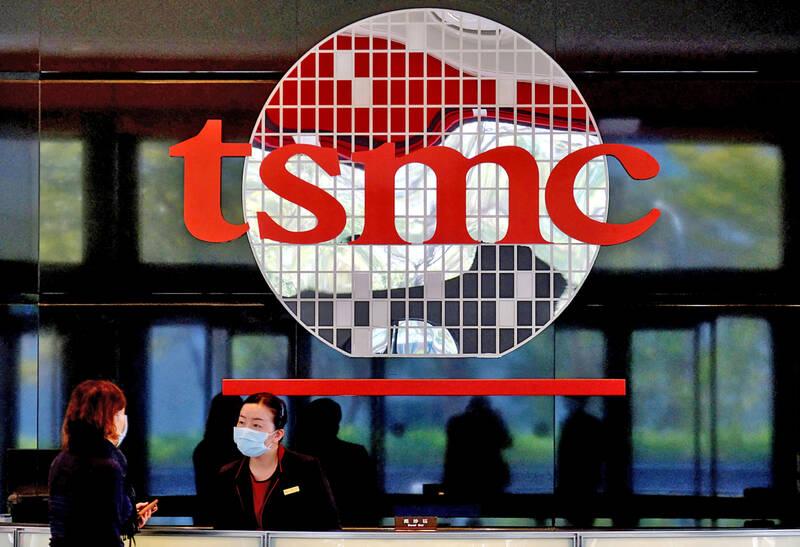Taiwan Semiconductor Manufacturing Co (TSMC, 台積電) would not produce its most advanced chips in the US next year, Minister of Economic Affairs J.W. Kuo (郭智輝) said today, after the company announced plans to invest another US$100 billion in US semiconductor manufacturing over the next four years.
US President Donald Trump and TSMC chairman C.C. Wei (魏哲家) yesterday announced that TSMC would invest in three new chip fabs, two advanced packaging plants and a research and development center in the US during a meeting at the White House.
By investing in the US, TSMC could avoid paying high tariffs, Trump said.

Photo: Sam Yeh, AFP
TSMC is already investing US$65 billion in Arizona to build three advanced wafer fabs.
The first fab in Arizona has started production using the 4-nanometer (nm) process, while the second fab, which is to be using the more sophisticated 3nm, 2nm and A16 processes, is currently under construction and is expected to begin production in 2028.
The third, of which TSMC has said little to date, is expected to begin production by 2030 using 2nm or more advanced processes, TSMC said in April last year.
Answering questions from lawmakers this morning, Kuo said “it would be impossible” for TSMC’s 2nm and 1.6nm chips to be produced in the US next year.
All overseas investments are subject to review, but approval of the TSMC deal is 99.9 percent certain, Kuo said in response to concern about whether the Department of Investment Review would find issues with the deal.
The government has been working with its allies to maintain peace and stability in the Asia-Pacific region, and any disruption to Taiwan would affect the entire world, including China, Premier Cho Jung-tai (卓榮泰) said.
Therefore, regardless of overseas investments and industrial expansion, Taiwan must continue to be a world leader in manufacturing, Cho added.
The government first heard that the deal was finalized in yesterday’s official announcement, but it maintained close and effective communication with TSMC regarding the project beforehand, Cho said.
Speaking to reporters before the session, Cho said that the plan aligns with Taiwan’s core principle of strengthening domestic industries while expanding its global presence.
The government wholeheartedly endorses initiatives that promote Taiwan’s key position in the global semiconductor supply chain and increase the competitiveness of Taiwanese chips, Cabinet spokesperson Michelle Lee (李慧芝) said in a news release.
The government would first conduct a thorough legal review into TSMC’s plans to ensure the development of the company and Taiwan’s semiconductor industry, she said.
The US is Taiwan’s most important trading partner and the two have cooperated for many years in the science and technology industry, boosting the economy and providing countless employment opportunities on both sides of the Pacific, she added.
Since Trump’s first term in office, Taiwan has been shifting investments stateside, with the US becoming Taiwan’s top outbound investment destination, constituting 30 percent of Taiwan’s foreign investments last year while investment in China has declined, she said.
Presidential Office spokesperson Karen Kuo (郭雅慧) said the government knew about the deal in advance and would assist.
It would also “ensure that the most advanced processes stay in Taiwan,” she added.

MAKING WAVES: China’s maritime militia could become a nontraditional threat in war, clogging up shipping lanes to prevent US or Japanese intervention, a report said About 1,900 Chinese ships flying flags of convenience and fishing vessels that participated in China’s military exercises around Taiwan last month and in January have been listed for monitoring, Coast Guard Administration (CGA) Deputy Director-General Hsieh Ching-chin (謝慶欽) said yesterday. Following amendments to the Commercial Port Act (商港法) and the Law of Ships (船舶法) last month, the CGA can designate possible berthing areas or deny ports of call for vessels suspected of loitering around areas where undersea cables can be accessed, Oceans Affairs Council Minister Kuan Bi-ling (管碧玲) said. The list of suspected ships, originally 300, had risen to about 1,900 as

Japan’s strategic alliance with the US would collapse if Tokyo were to turn away from a conflict in Taiwan, Japanese Prime Minister Sanae Takaichi said yesterday, but distanced herself from previous comments that suggested a possible military response in such an event. Takaichi expressed her latest views on a nationally broadcast TV program late on Monday, where an opposition party leader criticized her for igniting tensions with China with the earlier remarks. Ties between Japan and China have sunk to the worst level in years after Takaichi said in November that a hypothetical Chinese attack on Taiwan could bring about a Japanese

The WHO ignored early COVID-19 warnings from Taiwan, US Deputy Secretary of Health and Human Services Jim O’Neill said on Friday, as part of justification for Washington withdrawing from the global health body. US Secretary of State Marco Rubio on Thursday said that the US was pulling out of the UN agency, as it failed to fulfill its responsibilities during the COVID-19 pandemic. The WHO “ignored early COVID warnings from Taiwan in 2019 by pretending Taiwan did not exist, O’Neill wrote on X on Friday, Taiwan time. “It ignored rigorous science and promoted lockdowns.” The US will “continue international coordination on infectious

DEEP-STRIKE CAPABILITY: The scenario simulated a PLA drill that turned into an assault on Taiwan’s critical infrastructure, with the launchers providing fire support Taiwan yesterday conducted this year’s first military exercises at Longsiang Base in Taichung, demonstrating the newly acquired High Mobility Artillery Rocket System’s (HIMARS) ability to provide fire support and deep-strike capabilities. The scenario simulated an attack on Penghu County, with HIMARS trucks immediately rolling into designated launch areas and firing barrages at the Wangan (望安) and Cimei (七美) islands, simulating the provision of fire support against invading forces. The HIMARS are supposed to “fire and leave,” which would significantly increase personnel and equipment survivability, a military official said. The drill simulated an exercise launched by the Chinese People’s Liberation Army (PLA) Eastern